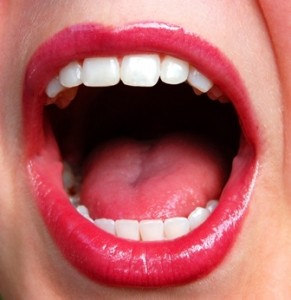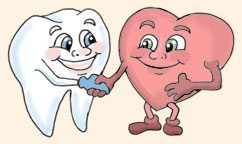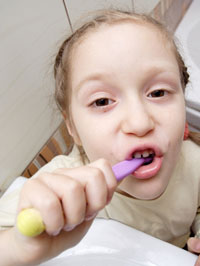 Every year, dentists all across the country hear complaints from their patients about tooth sensitivity. As a common oral health problem, tooth sensitivity is caused when the gums recede, exposing tooth roots. When hot or cold stimuli come into contact with these roots, a sensation is passed through the tubules in the roots directly to the nerve of the tooth, creating pain.
Every year, dentists all across the country hear complaints from their patients about tooth sensitivity. As a common oral health problem, tooth sensitivity is caused when the gums recede, exposing tooth roots. When hot or cold stimuli come into contact with these roots, a sensation is passed through the tubules in the roots directly to the nerve of the tooth, creating pain.
But, you might be wondering, what causes the gums to recede in the first place? Here are five of them:
Age – Believe it or not, aging plays a role in the level of tooth sensitivity you might experience. Research indicates that patients who are between 25 and 30 could experience more sensitivity than patients of other ages.
Brushing Technique – Depending on how you brush, you could be wearing down the enamel on your teeth, in the process exposing the sensitive dentin underneath. What’s more, brushing incorrectly can also harm the soft tissue of the gums and cause tooth roots to become exposed.
Bruxism – Bruxism is a medical term for something more simple and common—teeth grinding. Patients who struggle with teeth grinding may, over time, cause hairline fractures to develop in their teeth, making them vulnerable to hot or cold stimuli. What’s more, teeth grinding can also wreak havoc on tooth enamel, resulting in erosion of this protective barrier.
Cracked Teeth – When cracks develop in a tooth, it’s possible for bacteria to find a way inside, where it can irritate the interior pulp. As a result, teeth can respond negatively, with the end result being sensitivity.
Gum Disease – Gum disease is caused by bacteria and plaque that have built up around the teeth and gums. If left untreated, this common oral health problem will eventually result in the loss of gum tissue. As a result, tooth roots are exposed and left vulnerable to outside stimuli.
How Can I Protect My Teeth?
If you have problems with sensitive teeth, here are a few tips to keep in mind. First, try using a toothpaste brand that treats sensitivity. For many patients, this can bring the much-needed relief they’ve been looking for. Second, finish your brushing and flossing routine by rinsing with a fluoride rinse. Fluoride draws important minerals to teeth, strengthening them in the process. And lastly, visit your local dentist. By talking to your dentist and letting him or her see your smile, other recommendations can be made about how to help your smile.
 Have you noticed friends or co-workers stand further away than necessary to talk to you? Do you receive daily offers of gum and mints? Does your dog run away when you bend down and say hello? If the answer is yes to any of these questions … you probably have bad breath, also called halitosis.
Have you noticed friends or co-workers stand further away than necessary to talk to you? Do you receive daily offers of gum and mints? Does your dog run away when you bend down and say hello? If the answer is yes to any of these questions … you probably have bad breath, also called halitosis. Nearly 80% of American adults suffer from gum disease! Gum disease can devastate your oral health, causing serious dental problems. In fact, the number one reason for adult tooth loss in the United States is untreated gum disease. Worse, though, is the effect that gum disease can have on your heart health.
Nearly 80% of American adults suffer from gum disease! Gum disease can devastate your oral health, causing serious dental problems. In fact, the number one reason for adult tooth loss in the United States is untreated gum disease. Worse, though, is the effect that gum disease can have on your heart health.
 Getting ready to welcome a new member into your family is an exciting time. Between much-needed rests (sustaining a growing baby saps a lot of your energy!), you focus on all sorts of preparations. You’ll decorate the nursery, attend check-up visits and sonogram appointments with your doctor, and some unfortunate soul will be tasked with the job of putting together the baby’s crib.
Getting ready to welcome a new member into your family is an exciting time. Between much-needed rests (sustaining a growing baby saps a lot of your energy!), you focus on all sorts of preparations. You’ll decorate the nursery, attend check-up visits and sonogram appointments with your doctor, and some unfortunate soul will be tasked with the job of putting together the baby’s crib. If you’re over 50, you probably have new aches and pains every day. That’s just life. Sure, Madonna has graced the cover of AARP, but honestly, she probably has the same issues. Quality of life is the key to staying on top of your game once you’re over the hill… and a few miles down the path.
If you’re over 50, you probably have new aches and pains every day. That’s just life. Sure, Madonna has graced the cover of AARP, but honestly, she probably has the same issues. Quality of life is the key to staying on top of your game once you’re over the hill… and a few miles down the path. Dental caries (cavities) is the most prevalent childhood disease, and 90% of adults have had a cavity. Gum disease is responsible for 70% of adult tooth loss. A few simple habits could help you reduce your risk for cavities and gum disease – and improve your potential for keeping natural teeth long into your golden years. Kids and adults alike can benefit from these 5 quick and easy oral health tips. Some you’ve known since kindergarten, while others may be news.
Dental caries (cavities) is the most prevalent childhood disease, and 90% of adults have had a cavity. Gum disease is responsible for 70% of adult tooth loss. A few simple habits could help you reduce your risk for cavities and gum disease – and improve your potential for keeping natural teeth long into your golden years. Kids and adults alike can benefit from these 5 quick and easy oral health tips. Some you’ve known since kindergarten, while others may be news.  Statistics show that women are more likely to visit a dentist then men—but does this mean women have better oral health? Not necessarily. Women have specific oral health needs, and hormonal fluctuations throughout their lifetime can make them more susceptible to periodontal disease. Here are a few frequently asked questions concerning women’s oral health at various stages of life.
Statistics show that women are more likely to visit a dentist then men—but does this mean women have better oral health? Not necessarily. Women have specific oral health needs, and hormonal fluctuations throughout their lifetime can make them more susceptible to periodontal disease. Here are a few frequently asked questions concerning women’s oral health at various stages of life.  susceptible to gum disease, or is it the other way around? In recognition of National Diabetes Month, the International Diabetes Federation (IDF) has released some new guidelines on oral health for people with diabetes.
susceptible to gum disease, or is it the other way around? In recognition of National Diabetes Month, the International Diabetes Federation (IDF) has released some new guidelines on oral health for people with diabetes.